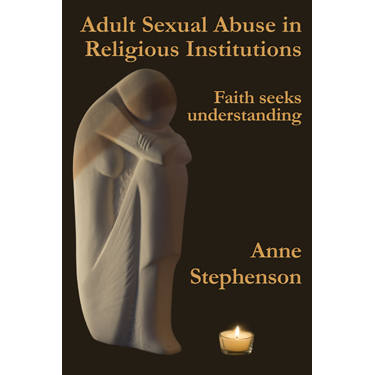Adult Sexual Abuse in Religious Institutions:
Faith Seeks Understanding
By Anne Stephenson 2016, Garside Publishing, 86 pages
Reviewer: Mary Caygill
in Methodist newspaper Touchstone March 2017
“In this book’s opening pages the author states clearly her intent in writing this resource, which is nothing less than naming what she calls the elephant in the room no one wants to name, and especially no one within religious institutions.
The naming of this ongoing reality is exactly what this author does. She claims quite rightly that no religious institution is devoid of the need to deal justly and compassionately with both ‘victim’ and ‘abuser’ when incidences of adult sexual abuse are brought to light and faced up to.
I deliberately choose to juxtapose these two words – ‘justly’ and ‘compassionately’ – as this is the approach the author takes in this valuable resource written out of personal experience.
The subtitle of the book – Faith Seeks Understanding – captures accurately what this book sets out to accomplish and I believe achieves in a most succinct, readable, and informative manner. As such, this book will be a valuable resource for all manner of people both inside and outside of religious institutions.
The author conveys well the complex issues that frame instances of sexual abuse. She helpfully identifies some of the key warning indicators along with some of the key psychological frames of reference that we need to understand to grasp the full extent of adult sexual abuse and particularly how and why it occurs within the context of religious institutions.
It is fair to say that all religious institutions have needed an urgent wake-up call to become aware of the realities of adult sexual abuse by its spiritual leaders. This crisis and the way it has been addressed have proven to be very impetuous.
In many cases there is a need to both address and establish far more robust procedures that work towards ensuring the pastoral and ethical accountability of those in key positions of trust and influence.
The language used by the author of ‘offender’ and ‘victim’ are rightfully used throughout the book to clearly identify and then address what is at heart an abuse of power which breaches the all-important ethical principle of ‘fiduciary duty’.
As the author establishes, within religious institutions this amounts to breaking the sacred trust between the leader (the one with power) and the congregant who has deemed the leader to be trustworthy.
Because of this sacred trust the consequences are life- changing and the healing required is immense and of a specialised nature both for the victim and offender. The author conveys well the full extent of both the abuse and the healing journey required.
I commend this book as a valuable pastoral resource. It is vital for all involved in any pastoral ministry.”

